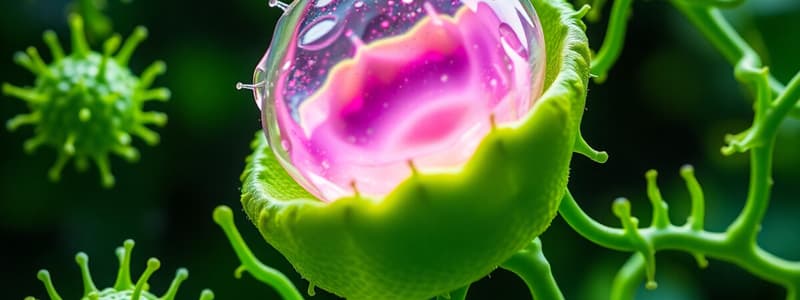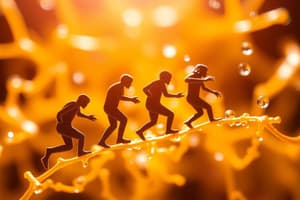Podcast
Questions and Answers
Which process refers to organisms creating new individuals of their species?
Which process refers to organisms creating new individuals of their species?
- Respiration
- Adaptation
- Reproduction (correct)
- Growth
What is the correct order of biological organization from smallest to largest?
What is the correct order of biological organization from smallest to largest?
- Cell → Tissue → Organ → Organ System → Organism → Ecosystem
- Atom → Molecule → Macromolecule → Organelle → Cell → Tissue → Organ → Organ System → Organism → Population → Community → Ecosystem → Biosphere (correct)
- Molecule → Macromolecule → Organelle → Tissue → Cell → Organism
- Atom → Molecule → Cell → Tissue → Organism → Population
Which of the following best describes the scientific method?
Which of the following best describes the scientific method?
- A method for creating hypotheses only
- A systematic approach to experimenting without analysis
- An established framework for understanding through observation, hypothesis formation, experimentation, analysis, and conclusion (correct)
- A random series of steps for testing theories
What encompasses traits and physical characteristics that aid survival?
What encompasses traits and physical characteristics that aid survival?
Why is biodiversity important for ecosystems?
Why is biodiversity important for ecosystems?
What unifies the study of all living organisms according to Cell Theory?
What unifies the study of all living organisms according to Cell Theory?
Which statement best describes evolution by natural selection?
Which statement best describes evolution by natural selection?
What is the main focus of microbiology?
What is the main focus of microbiology?
In the context of metabolism, what does catabolism refer to?
In the context of metabolism, what does catabolism refer to?
Which branch of biology focuses on plant life?
Which branch of biology focuses on plant life?
What is a key function of homeostasis in living organisms?
What is a key function of homeostasis in living organisms?
What role does photosynthesis play in the ecosystem?
What role does photosynthesis play in the ecosystem?
Which of the following best describes the focus of genetics?
Which of the following best describes the focus of genetics?
Flashcards
Reproduction
Reproduction
The process by which organisms create new individuals of their species.
Growth and Development
Growth and Development
The increase in size and complexity that occurs in organisms over time.
Adaptation
Adaptation
The evolutionary process where organisms become better suited to their environment. Includes traits and physical characteristics that aid survival.
Scientific Method
Scientific Method
Signup and view all the flashcards
Biological Diversity
Biological Diversity
Signup and view all the flashcards
What is Biology?
What is Biology?
Signup and view all the flashcards
What is Cell Theory?
What is Cell Theory?
Signup and view all the flashcards
What is Evolution by Natural Selection?
What is Evolution by Natural Selection?
Signup and view all the flashcards
What is Homeostasis?
What is Homeostasis?
Signup and view all the flashcards
What is Metabolism?
What is Metabolism?
Signup and view all the flashcards
What is Botany?
What is Botany?
Signup and view all the flashcards
What is Zoology?
What is Zoology?
Signup and view all the flashcards
What is Photosynthesis?
What is Photosynthesis?
Signup and view all the flashcards
Study Notes
Introduction to Biology
- Biology is the scientific study of life and living organisms, including their structure, function, growth, origin, evolution, distribution, and taxonomy.
- It encompasses a wide range of disciplines, including botany, zoology, microbiology, genetics, and ecology.
- Biology aims to understand the fundamental principles of life and how organisms interact with their environment.
Key Concepts in Biology
- Cell Theory: All living organisms are composed of cells, which are the basic units of life. Cells arise from pre-existing cells. This theory unifies the study of plants, animals, and microorganisms.
- Evolution by Natural Selection: Organisms change over time due to variations in traits, survival of the fittest, and reproduction. Adaptive traits are advantageous for survival in a particular environment, increasing the chances of those organisms passing on their genes to future generations.
- Homeostasis: Maintaining a stable internal environment despite external changes. This is crucial for the proper functioning of living organisms, involving complex regulatory mechanisms.
- Metabolism: All the chemical processes within an organism that maintain life, including catabolism (breaking down molecules) and anabolism (building molecules).
Branches of Biology
- Botany: Focuses on plant life, including their structure, function, classification, evolution, and ecology. Covers a wide spectrum of plant-related subjects.
- Zoology: Studies animals, their behavior, physiology, evolution, and classification. Includes a variety of animal studies.
- Microbiology: Examines microscopic organisms like bacteria, viruses, fungi, and protists. This branch is vital for understanding disease and various aspects of life.
- Genetics: Investigates heredity and the mechanisms of the transmission of traits from one generation to the next. Emphasizes the role of DNA in determining characteristics.
- Ecology: Studies the interactions between organisms and their environment, encompassing factors like climate, resources, and interactions with other species.
Biological Processes
- Photosynthesis: The process by which plants and some other organisms convert light energy into chemical energy in the form of sugars. This is a crucial process for sustaining life on Earth.
- Respiration: The process of releasing energy from food molecules (like glucose). Animals and plants need respiration to generate energy for their activities.
- Reproduction: The process by which organisms create new individuals of their species.
- Growth and Development: The increase in size and complexity that occurs in organisms over time.
- Adaptation: The evolutionary process where organisms become better suited to their environment. This encompasses traits and physical characteristics that aid survival.
Levels of Biological Organization
- Atom → Molecule → Macromolecule → Organelle→ Cell → Tissue → Organ → Organ System → Organism → Population → Community → Ecosystem → Biosphere
- This hierarchical organization structure shows how components build up to complex systems.
Scientific Method
- A systematic approach to investigating the natural world, including observation, hypothesis formation, experimentation, data analysis, and conclusion. This framework is foundational to biological research and scientific advancement.
Biological Diversity
- The variety of life on Earth at all its levels, from genes to ecosystems.
- Species richness and diversity are of major concern.
- Conservation efforts aim to protect biodiversity and maintain healthy ecosystems.
Studying That Suits You
Use AI to generate personalized quizzes and flashcards to suit your learning preferences.




